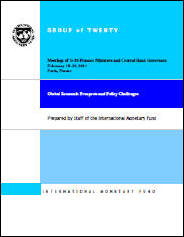Group of Twenty -- Meeting of G-20 Finance Ministers and Central Bank Governors
IMF Note on Global Economic Prospects and Policy Challenges
February 18-19, 2011, Paris, France
About the Executive Summary
The Following executive summary is from a note by the Staff of the IMF prepared for the February 18-19, 2011 meeting of the Group of Twenty Finance Ministers and Central Bank Governors in Paris, France
Read the Full text ![]()
Executive Summary
The global economic recovery is advancing, albeit at an uneven pace. Global GDP increased at a stronger-than-expected annualized rate of over 3½ percent in 2010Q3.
- In G-20 advanced economies, activity has moderated less than expected, but growth remains subdued and insufficient to significantly reduce still-high unemployment.
- In G-20 emerging economies, growth remains robust, buoyed by strong domestic demand and the recovery of global trade, still-accommodative policy stances, and resurgent capital flows. However, inflationary pressures are building, and there are emerging signs of overheating in some economies.
While financial turbulence has receded in recent weeks, underlying stresses in peripheral euro area economies remain unresolved and are linked to the core through financial exposures. Markets are looking for more capacity and flexibility of the current crisis management facilities and clarification about the permanent European Stability Mechanism (ESM). ECB intervention and strengthening of national policy actions in countries under pressure have led to some recent positive market developments, including the successful bond issuance by the European Financial Stability Facility (EFSF). Nonetheless, banks face continued funding strains and many remain reliant on ECB liquidity support, while banking and sovereigns risks remain closely intertwined.
In line with the two-speed recovery, downside risks remain elevated in advanced economies, while overheating risks are growing in emerging economies. Intensification and broadening of financial sector strains resulting from sovereign and banking sector risks in the euro area periphery is a significant risk to the recovery in the region and possibly beyond. Overheating and building inflationary pressures in some emerging economies, exacerbated by large capital flows and rising commodity prices (with adverse consequences for lower income countries), and a potentially steep correction of property prices in China have emerged as pertinent risks to the recovery. Another downside risk stems from insufficient progress in developing medium-term fiscal consolidation plans, especially in the United States and Japan.
Cooperative and well-timed policy initiatives across the G-20 are critical to sustain the global recovery, while reducing global imbalances.
- In G-20 advanced economies, the most urgent requirements are for comprehensive and rapid actions to overcome sovereign and financial stresses in the euro area and accelerate progress in developing medium-term fiscal consolidation plans. Rapid progress in the repair and reform of financial systems—critical to the normalization of credit conditions—would help reduce the burden on monetary and fiscal policy to support the recovery, and potentially help stem volatile capital flows to emerging economies.
- In G-20 emerging economies, the key policy challenge is to keep overheating pressures in check and respond appropriately to capital inflows. In key surplus economies, overheating pressures can be alleviated by permitting currency appreciation, facilitating a healthy rebalancing from external to internal demand.

